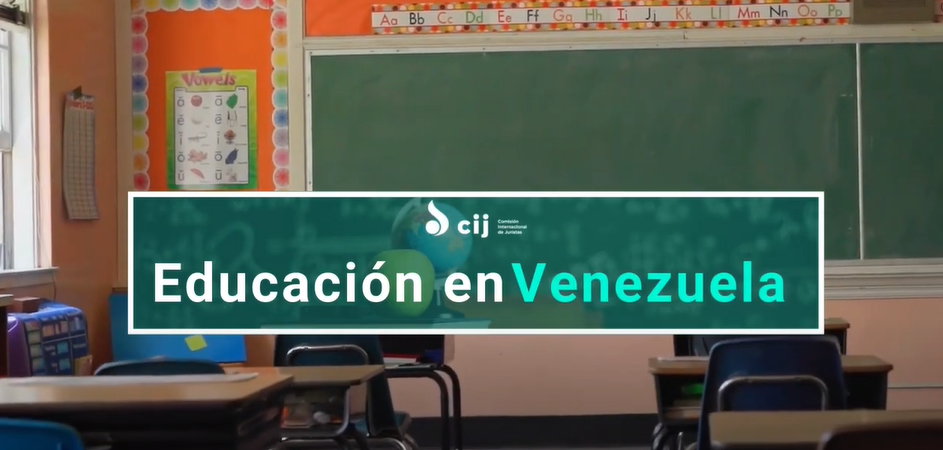In a report released today on the right to education in Venezuela, the International Commission of Jurists (ICJ) called on Venezuela to take immediate measures to reverse the sharp deterioration of the public education system over the past decade.
The report, Hidden in broad daylight: The decline of public education in Venezuela, looks especially at the fallout from the COVID-19 pandemic, concluding that the authorities had overwhelmingly failed to ensure that students had full access to the right to education at the outbreak and throughout the course of the pandemic.
This dereliction of State responsibility during the pandemic served to exacerbate what was already substandard performance in fulfilling the right to education. The current state of the education system is characterized by dilapidated school infrastructure, teacher shortages, high dropout rates, and generally poor-quality education.
“In open contradiction to the stark reality faced by millions of students and teachers, the Venezuelan authorities have repeatedly claimed that the public education system is largely adequate to fulfill the right to education”, said Santiago Canton, ICJ Secretary General.“ While the dropout rates are appallingly high, and teachers are not paid a living wage, the government appears to have no plan or policy to reverse this trend”, added Canton.
The report assesses the main causes and consequences of the worsening educational situation during the pandemic, looking especially to the perspective of students and teachers. These include the shortcomings of the “Every Family a School” Plan (Plan Cada Familia una Escuela), the cornerstone of the government’s response to guarantee the right to education during the COVID-19 pandemic.
The report also provides a general overview of the public education system in Venezuela before the COVID-19 pandemic. The report shows that critical elements necessary for a well-functioning education system have deteriorated since at least 2015. This deterioration is partly due to a well-documented humanitarian emergency and the erosion of the rule of law in the country. The humanitarian emergency has had a negative impact on building infrastructure, access to public services in schools, the school feeding programme, dropout rates, and teachers’ salaries and working conditions. In addition, the absence of a well-functioning rule of law system has prevented transparency and accountability in education policies and its results.
“The deplorable state of public education in Venezuela is inextricably linked to the erosion of the rule of law and the complex humanitarian emergency that this erosion has created. In this particular case, the failure to provide for the rule of law and the full spectrum of human rights protections, including the right to education, is jeopardizing the future of millions of Venezuelan children,” mentioned Santiago Canton.
The ICJ recommends that the responsible Venezuelan authorities, particularly the Ministry of Education, address the extreme degradation in the state of education in the public sector by adopting laws, policies, and specific measures to ensure that students receive a quality education from well-prepared and well-paid teachers in schools with adequate infrastructure and equipment. To do so, among others, the Ministry of Education should:
- increase the provision, quantitatively and qualitatively, of material and human resources for the public education system at pre-primary, primary, and secondary levels;
- make an assessment of the educational setbacks caused by the COVID-19 pandemic;
- prioritize the universalization and improvement of the quality of the school feeding programme;
- give priority to ensuring the availability and acceptability of public services in schools; and
- take concrete measures to guarantee the enjoyment of labour rights of teachers.
Background
The ICJ has documented the degradation of the rule of law and protection of human rights in Venezuela for more than a decade. The ICJ has evaluated the state of the justice system and documented threats, attacks, and obstacles to the fair and effective administration of justice, and accountability for human rights violations. Since 2014, the ICJ has published the following nine reports:
- No will for Justice in Venezuela: A Prosecutor’s Office that fosters impunity (2024)
- Lawyers under Attack: Barriers to the legal profession in Venezuela (2022)
- Judges on the Tightrope: Report on the Independence of the Judiciary in Venezuela (2021)
- No Room for Debate: The National Constituent Assembly and the Crumbling of the Rule of Law in Venezuela (2019)
- The Trial of Civilians by Military Courts in Venezuela (only available in Spanish) (2018)
- The Supreme Court of Justice of Venezuela: An Instrument of the Executive Branch (2017)
- Achieving Justice for Gross Human Rights Violations in Venezuela (2017)
- Venezuela: The Sunset of the Rule of Law (2015)
- Strengthening the Rule of Law (2014)
The ICJ has also documented the devasting impact of the COVID-19 pandemic on the exercise of human rights both worldwide and in particular in Venezuela:
- COVID-19 devastates an educational system already in crisis (2022)
- Venezuela: lack of access to safe water aggravates the COVID-19 pandemic (2021)
- Venezuela: indigenous peoples face deteriorating human rights situation due to mining, violence and COVID-19 pandemic (2021)
- Women facing health risks and gender-based violence in Venezuela (2020)
- The Right to Health of Venezuelans in Colombia: From Principle to Policy (Part 1) (2020)
- The Right to Health of Venezuelans in Colombia: From Policy to Practice (Part 2) (2020)
- Living Like People Who Die Slowly: The Need for Right to Health Compliant COVID-19 (2020)
Please find the Spanish version of the report here: Oculto a plena luz del día: el declive de la educación pública en Venezuela





